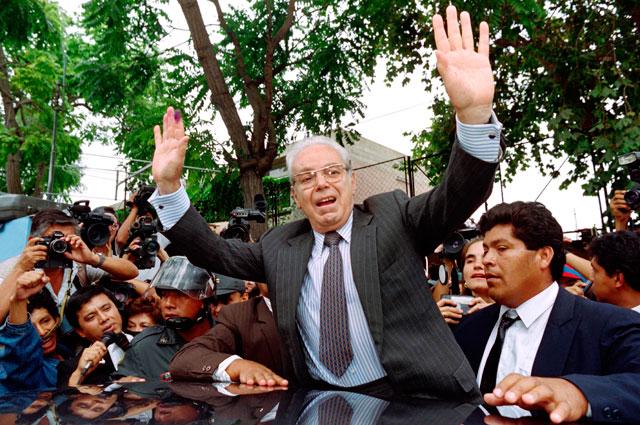You are here
Peru votes in legislative elections key to president’s reform bid
By AFP - Jan 26,2020 - Last updated at Jan 26,2020
LIMA — Peruvians headed to the polls on Sunday for legislative elections that President Martin Vizcarra hopes will put an end to a political crisis and clear the way for anti-corruption reforms.
Polling stations opened throughout the country of 25 million people at 8:00am (13:00GMT) in an election called after Vizcarra dissolved parliament in September in a bid to overcome an impasse with the Keiko Fujimori-led opposition.
Voters in Lima queued up to vote long before the doors opened, AFP reporters at the scene said.
The vote — the first time parliamentary elections have been held separately from presidential elections — comes just 15 months ahead of the next general election.
Fujimori’s Popular Force Party held an absolute majority in the single-chamber legislature with 73 out of 130 seats, but on Sunday they are expected to suffer a drubbing, largely due to a sprawling corruption scandal that has ensnared Fujimori.
Fujimori is accused of accepting $1.2 million in illicit party funding from Brazilian construction giant Odebrecht for her 2011 election campaign.
Odebrecht has admitted to paying at least $29 million to Peruvian officials since 2004, and bribing four former Peruvian presidents.
“Popular Force thinks it can win 20-25 congressmen, but compared with the absolute dominion it had, it will lose a lot,” analyst Luis Benavente, director of the Vox Populi consultancy, told AFP.
“Fujimorism will be the big loser in this election.”
Popular Force has been the major bloc in Congress since the last election in 2016, but Fujimori is expected to pay for the Odebrecht scandal.
The 44-year-old daughter of jailed former president Alberto Fujimori (1990-2000), she has seen her popularity plummet.
She has already spent 13 months in pre-trial detention before being released in November, and on Tuesday faces a judge’s decision on whether to send her back to jail.
“The election winner is going to be Martin Vizcarra, because he will have managed to change the hostile congress of the last few years,” political analyst Augusto Alvarez told AFP.
Popular Force’s main allies in the legislature, the social democrat APRA, also have been hurt by the corruption scandal.
APRA’s ex-leader Alan Garcia, a two-time former president (1985-1990, 2006-2011), committed suicide in April as police turned up at his home to arrest him in a corruption case related to the Odebrecht scandal.
Popular support
In a widely popular move Vizcarra dissolved congress on September 30.
The opposition accused him of a “coup d’etat” and swore in Vice President Mercedes Araoz as “acting president”, but she resigned the following day.
The opposition took its case to the constitutional court, which ruled in Vizcarra’s favour.
Demonstrators took to the streets to support Vizcarra and his anti-corruption push.
Polls showed 90 per cent support for the president’s daring move.
Other opinion polls ahead of the election suggest there could be a hung legislature, with centrist parties expected to do well.
Vizcarra doesn’t have a party himself but “will achieve a more bearable relationship with the centrist parties that achieve a majority in congress”, said Alvarez.
And he needa legislative support for his anti-corruption reforms.
If centrists do dominate congress, “Vizcarra won’t have the same level of opposition that characterised his relationship” with the Fujimori-dominated legislature, said Alvarez.
Apathy
The new lawmakers will sit for only 16 months until the April 2021 general election, and a new president is due to take office three months after that.
Neither Vizcarra nor any of the new lawmakers will be eligible for reelection in 2021, so only 16 are currently seeking reelection.
There are more than 2,000 candidates representing 13 parties, and for the first time an indigenous transgender candidate.
However, there has been strong voter apathy this electoral cycle.
The vote “is to fill a void. The fall of the establishment and Fujimorism’s loss of dominion means there’s a clean slate in Peruvian politics”, analyst Carlos Melendez told AFP.
Fujimori’s Popular Force is nevertheless expected to win the second largest number of votes behind the centrist Popular Action Party.
“It’s hard to kill Fujimorism,” warned Melendez.
Alvarez said the party “will be a relevant force”.
The election will be observed by the European Union and Organisation of American States.
Related Articles
LIMA — Peru's Keiko Fujimori-led opposition suffered a crushing blow at legislative elections, losing dozens of seats in the Congress it had
LIMA — Ollanta Humala on Monday became the first ex-president of Peru to go on trial in a vast corruption case involving Brazilian construct
LIMA — Former UN chief Javier Perez de Cuellar, who was known for his peace-making efforts including brokering a ceasefire in the Iran-Iraq

















